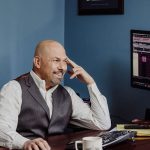By Thomas Britt
What’s even better than a steady paycheck? Getting a benefits package from your company in addition to your paycheck!
You likely already know how your company’s benefits package helps you on a day-to-day basis (e.g., health insurance), but you may not be aware of all the ways to maximize everything your employer offers. In fact, if you play your cards right, you can get free money and save on taxes.
Allow me to explain.
Maximize 401(k) Matching
If your employer offers a 401(k) retirement plan with employee matching, definitely take advantage of this benefit. Employee matching is when an employer will match up to a certain percentage of the employee’s overall contribution in addition to what the employee has already saved up. In other words, it is free money that is coming directly out of your employer’s pocket.
For example, if you have $15 million in your portfolio and your employer matches 100% of 3%, then your employer will give you an additional $450,000, making the final total $15.45 million if you choose to cash out your portfolio immediately.
Do not leave free money on the table. Make sure your contributions qualify you for the maximum amount of employer matching, and a little extra if you have wiggle room.
Take Advantage of Health or Flexible Spending Accounts
Health savings accounts (HSAs) and flexible spending accounts (FSAs) save you money in taxes for everyday needs such as doctors’ appointments, medical care, prescriptions, healthcare for dependents, as well as childcare. When you enroll, money is taken out of your paycheck and put into these special accounts. Not only is this money tax-free to use for qualified expenses, but it will make your annual income appear smaller, resulting in paying less income tax.
For example, if you are single and make at least $250,000 and make the maximum contribution to your FSA ($2,750 for 2020), (1) then you stand to save around $1,113 in taxes. (2)
Opt in to the Life Insurance Option
If your employer offers life insurance below market price, you have nothing to lose by enrolling. In fact, it is a win-win for you. While it is hard to think about what would happen to your family if something were to happen to you, it is vital to have a will or living trust and a life insurance policy to cover the loss of income that would result from your death. You want to make sure your family is able to maintain their lifestyle and expenses when you are gone.
How We Can Help
Your company’s benefits package can make a significant difference in your family’s finances and are an important part of your overall financial plan. We would be happy to meet with you to review what your employer offers to ensure you’re making the most of the benefits available to you. An analysis of your options can help you make the best, most advantageous decision based on your specific circumstances.
Call 860-434-6890 or email me at thomas.britt@bwmllc.net to schedule a review.
About Thomas
Thomas J. Britt is managing director of Benchmark Wealth Management, LLC, with 20 years of experience in the financial industry. He specializes in executive financial planning, retirement planning, investing, as well as the management of trusts and endowments. Thomas is a CERTIFIED FINANCIAL PLANNER™ (CFP®) professional and holds the Master Planner Advanced StudiesSM (MPAS®), Certified Investment Management Analyst (CIMA®), and Chartered Retirement Planning Counselor (CRPC®) designations. He earned a Bachelor of Science in Finance from the University of New Haven, an MBA in financial technology from Rensselaer Polytechnic Institute, and a Master of Science in Personal Financial Planning from the College for Financial Planning. He is also a proud veteran of the United States Navy Submarine Force. Learn more about Tom by connecting with him on LinkedIn.
Additional information, including management fees and expenses, is provided on our Form ADV Part 2, available upon request or at the SEC’s Investment Advisor Public Disclosure site, www.adviserinfo.sec.gov/firm/160192
Securities offered by Registered Representatives through Private Client Services, Member FINRA, SIPC in the following states: AZ, CA, CT, FL, KY, MA, ME, MI, MN, NH, NJ, NY, RI, TX. (Securities-related services may not be provided to individuals residing in any state not previously listed) Advisory services offered through Benchmark Wealth Management, LLC a Registered Investment Advisor. Benchmark Wealth Management and Private Client Services are unaffiliated entities.
___________
(2) https://www.cigna.com/personal/health-and-well-being/tools/fsa-calculator/










 Tom’s life experience includes over 19 years in the financial services industry, 10 years in engineering as an Operations Supervisor for a Fortune 500 subsidiary and he is a proud Veteran of the United States Navy Submarine Force. Tom draws on his professional experience to assist clients in creating and executing wealth management strategies, which help guide his clients towards achieving their financial goals.
Tom’s life experience includes over 19 years in the financial services industry, 10 years in engineering as an Operations Supervisor for a Fortune 500 subsidiary and he is a proud Veteran of the United States Navy Submarine Force. Tom draws on his professional experience to assist clients in creating and executing wealth management strategies, which help guide his clients towards achieving their financial goals.
